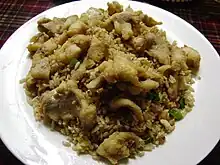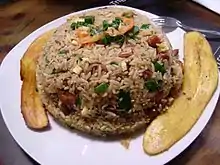Arroz chaufa
Arroz chaufa, also known as arroz de chaufa ("Chinese rice"), is a fried rice dish from Peru. It is part of the Chinese Peruvian cuisine, which is called chifa.[1][2]
.jpg.webp) Arroz chaufa with beef | |
| Alternative names | Cocina nikkei Comida china Fried rice |
|---|---|
| Course | Main course |
| Place of origin | Peru |
| Associated cuisine | Chifa |
| Serving temperature | Hot |
| Main ingredients | Rice, egg, soy sauce, Chinese onions |
| Ingredients generally used | Chilli peppers |
| Variations | Pork, beef, chicken, or shrimp |


Arroz chaufa consists of a mix of fried rice with vegetables, usually including scallions, eggs, and chicken, quickly cooked at high heat, often in a wok with soy sauce and oil.[1][3] It comes from the Chinese cuisine due to the influx of Chinese immigrants to Peru at the end of the 19th century.[4]
The meats typically used are usually pork, beef, chicken, and shrimp. Dark soy sauce is preferred for use with Peruvian fried rice. A person specialized in the art of making arroz chaufa is known as a chaufero.[5]
Etymology
The word "chaufa" comes from the Chinese word "chaofan" (Traditional Chinese: 炒飯, Simplified Chinese: 炒饭, Pinyin: chǎofàn, Cantonese: Cháau Faahn), literally “(stir) fried rice".[2]
Variations
A variation of arroz chaufa is the chaufa amazónico, a fried rice made with ingredients from the Amazon region in Peru. It typically includes cecina (a salted dried meat) and maduros (sweet plantains).
Besides rice, a common ingredient in most arroz chaufa is the cebollita china (spring onion, Allium fistulosum). It is also possible to adapt the recipe with other grains, like quinoa and wheat.[1] In some regions the rice is replaced with quinoa or pearled wheat while in others, rice is mixed with noodles.
The dish is accompanied by soy sauce and/or an ají-based cream.[5]
Besides this, many other ingredients may be found in the dish:
- Arroz chaufa with chicken
- Arroz chaufa with beef
- Arroz chaufa with pork
- Aeropuerto ("airport"): when the dish includes tallarín saltado, another chifa dish, on the same plate.[6]
- Arroz chaufa "wild"
- Arroz chaufa with duck
- Arroz chaufa with jerky
- Arroz chaufa with seafood
- Arroz chaufa with fish
- Arroz chaufa with alligator or lizard
- Arroz chaufa "special"
- Arroz chaufa "Taypa"
See also
References
- «¿Cómo surge el Arroz chaufa, uno de los platos fusión más populares en Perú?». http://www.peru.travel. 5 de julio de 2021. Consultado el 27 de noviembre de 2021.
- «Historia del arroz chaufa». Abrecht. Consultado el 27 de noviembre de 2021. Internet Archive
- Arroz chaufa Peru Recipes
- «Arroz chaufa peruano». Bon Viveur. 11 de junio de 2020. Consultado el 27 de noviembre de 2021.
- Rodríguez Pastor, Humberto (2008). «Gastronomía chino-cantonesa y el chifa peruano». Gaceta Cultural del Perú (32).
- Acurio, Gastón. (2008). Larousse de la gastronomía peruana : diccionario gatronómico ilustrado (1 ed.). Lima, Perú: Q.W. Editores. ISBN 978-9972-58-937-9. OCLC 697036587.
Further reading
- Rodríguez Pastor, Humberto (2008). "Gastronomía chino-cantonesa y el chifa peruano" [Chinese-Cantonese Gastronomy and the Peruvian Chifa]. Gaceta Cultural del Perú (in Spanish). 32.
- Zapata Acha, Sergio (November 2006). Diccionario de gastronomía peruana tradicional [Dictionary of traditional Peruvian gastronomy] (in Spanish) (1 ed.). Lima, Peru: Universidad San Martín de Porres. ISBN 9972-54-155-X.
- León, Rafo (2007). Lima Bizarra. Antiguía del centro de la capital [Bizarre Lima. Ancient center of the capital] (in Spanish) (2 ed.). Lima-Perú: Aguilar. pp. 134–136. ISBN 978-9972-848-17-9.
- "Con feria gastronómica promueven consumo de pescado en Cajamarca" [With gastronomic fair promote fish consumption in Cajamarca]. Agencia Andina de Noticias (in Spanish). November 7, 2008.
- Miranda, Luis (2008). "Probando la amazonía" [Testing the Amazon]. Gaceta Cultural del Perú (in Spanish). 32.
- "Beneficiarias ancashinas de Juntos ganan concurso ¡San Marcos con Mucho Gusto!". Agencia Andina de Noticias (in Spanish). December 23, 2008.